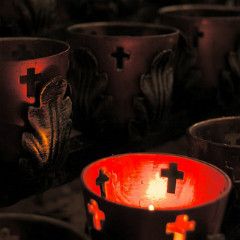I run into people from time to time who are very skeptical of religious ritual, things like liturgy or hourly prayers, practices like fasting or crossing yourself. If we discuss it, they usually tell me that they think it’s deadening, that their spirituality is vital and free and that ritual would stifle things.
I think I understand the resistance. Some come from families that just seemed to cycle through the motions at church. Some of those families were very serious and consistent, others almost irreligious in every other way; both left the impression that their engagement was lifeless, even faithless.
Others have simply never tried it. They have a preconception of what ritual is all about, and they think embracing it would be a giant spiritual step backward.
My personal experience was more like the latter, but it turns out that I was very wrong. I have found — and many others I know have as well — that vital faith combined with traditional ritual proves spiritually enriching. Here are two initial reasons why:
1. Ritual provides structure for faith
Ritual contours our spirituality the same way a cup contours a beverage. Remove the cup and you have an accident, a word that pretty well describes my Christian walk before encountering ritual’s comely structures.
I don’t know if the observation was original to him, but a friend once said that ritual is the grammar of faith. Grammar isn’t the substance of language, but its structures and precision help language reach fuller, richer meaning. Ritual can do the same thing for faith.
Many of us have faith like a rambling run-on sentence, all meandering and going who-knows-where. It’s not that it’s bad. It’s just missing direction. We know our faith has meaning, but the full depth of that meaning is unavailable or unattainable to us because we’ve not availed ourselves of the formative, shaping power of ritual.
2. Ritual enlivens faith
Augustine wrote about this while discussing the physicality of prayer. God doesn’t need people to “bend their knees . . . stretch forth their hands, or even prostrate themselves on the ground, [or] whatever else they visibly do. . . .” After all, he said, God knows “their invisible will and heart’s intention. . . .”
But the ritual of prayer “excites” a more prayerful spirit. As the outward acts are done in faith, the inward, spiritual reality of that faith increases. Augustine said “the heart’s affection . . . grows because [the ritual motions] are made.”
I find this generally true of liturgical worship, using a prayer book, crossing myself, lighting candles for prayer, and other ritual activities as well. They stir my heart, and best of all they bring my heart along when it’s heavy or distracted or even resistant. Instead of being a dead weight, ritual excites and energizes my faith. I can start out saying my prayers by rote and find myself at the end fully, spiritually engaged. And I never would have arrived in the second of those states if I didn’t begin with simple ritual.
Ritual can be form without power. We’ve all seen that, and some have suffered by it. But don’t close the door; the form of ritual filled with the Spirit’s power can be enriching beyond measure.













